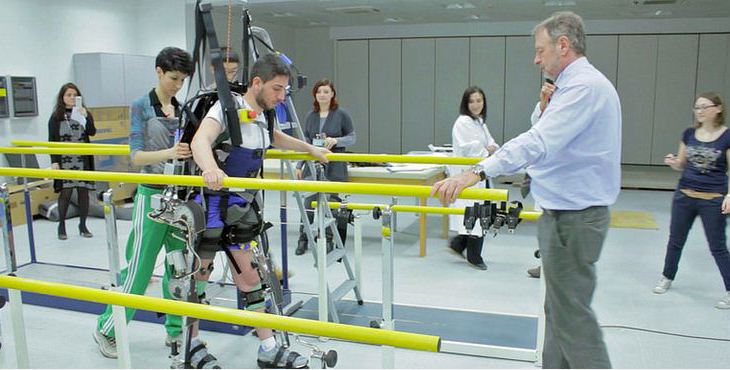Title: The Walking Mind
Director: Andrea Fasciani
The young Italian director, Andrea Fasciani, has conquered the Rome Docscient Festival 2014, winning the category on “Scientific Disclosure.” His documentary ‘The Walking Mind,’ accounts the life of four patients who lost the use of their legs, and newly found it through a robotic mechanism.
The story is set in the labs of Fondazione Santa Lucia in Rome and tells the odyssey of Alessandro, Emanuele, Giovanni and Marius, who managed to walk again thanks to a terrific team of doctors, engineers and physiotherapists.
Filmmaker Andrea Fasciani unveils the European project “Mindwalker” – echoed in the title of the movie – conceived in several research centres located in Germany, Holland, Belgium and Iceland. The history of exoskeletons goes back to the sixties when the US army started collaborating with General Electric to provide soldiers the tools to face the most challenging circumstances. In the course of time this research has stemmed out as a clinical device to reprise the use of limbs that would otherwise be forever inanimate, providing valid alternatives to wheelchairs and crutches.
We are so accustomed to science-fiction in motion pictures, where humanoid robots are a fantasy, or the narrative tool to demonise the advent of technology, that the progress of science and its benefits are too often tossed aside. This time, far from fiction, the account of true life is impressed on film – i.e. a documentary – and it poetically conveys the benefits of technology. Thus, the exoskeleton that has been so often feared on screen, assumes a friendly trait by restoring limb movement.
Machines aren’t necessarily a threat to mankind. It all depends on the way they are used and ‘The Walking Mind’ attests that through biomedical engineering mind and body can wander together, making miracles a reality.
Technical: B
Story: A
Overall: A-
Written by: Chiara Spagnoli Gabardi

